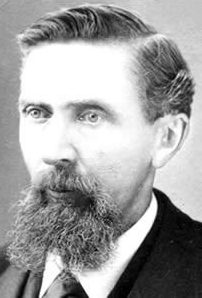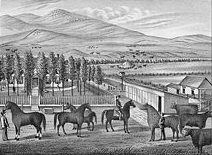 When Conrad Kohrs, immigrated to the United States at the age of 15, he was seeking his fortune like so many other immigrants were. The year was 1850, and while it is odd these days to think of a 15 year old boy immigrating to America alone now, it wasn’t entirely unheard of then. Kohrs was a native of Denmark, and had planned to head west to make his fortune in gold or silver. Unfortunately, while he had some small success in California and British Columbia, try as he might, the “big strike” always eluded Kohrs.
When Conrad Kohrs, immigrated to the United States at the age of 15, he was seeking his fortune like so many other immigrants were. The year was 1850, and while it is odd these days to think of a 15 year old boy immigrating to America alone now, it wasn’t entirely unheard of then. Kohrs was a native of Denmark, and had planned to head west to make his fortune in gold or silver. Unfortunately, while he had some small success in California and British Columbia, try as he might, the “big strike” always eluded Kohrs.
Kohrs tended to follow the crowd, and in 1862, he joined the latest western gold rush and headed for western Montana, where rich gold deposits had been found at Grasshopper Creek. It might be true that gold was plentiful at Grasshopper Creek, but Kohrs realized that he could make more money mining the miners than mining for gold. Miners need lots of supplies, and the man who was able to supply the needs, was the one who made money. He established a butcher shop in the mining town of Bannack and began to prosper.
His work as a butcher led Kohrs into the cattle business. Cattle were a big commodity, being in relatively short supply in frontier Montana. Much has changed today, and Kohrs had a big part in that. Kohrs traveled around the territory to purchase prime animals. He had several brushes with the highwaymen who plagued the isolated roads of Montana. Determined to stop these murderous bandits, Kohrs joined a group of Virginia City vigilantes, and helped track down and hang the outlaws. By 1864, robberies in the territory had plummeted. Proper or not, vigilante justice, got the point across very well.
Whether he was good at being part of a vigilante group or not, it couldn’t be what made his living. Kohrs began shifting the focus of his meat processing business to the supply side. In 1864, he established a large ranch near the town of Deer Lodge, where he fattened his cattle for market. Kohrs was pretty much the only major rancher in the western region of the territory. This caused his business to boom as Montana grew. As always happens, eventually, competition from cattle driven overland into the territory from Texas began to challenge Kohrs’ monopoly. Nevertheless, he continued to prosper, and remained the largest cattle rancher in Montana for several decades. 
Kohrs entered the political arena in 1885, translating his economic strength into political power. He was elected to the Montana Territorial Legislature. Kohrs and his fellow ranchers had considerable influence over Montana in the years to come, and Kohrs went on to become a state senator in 1902. The big ranchers never had a free hand in Montana, however, because mining interests and farmers always kept the ranchers in check, but it wasn’t for a lack of trying. Kohrs was widely celebrated as one of the greatest pioneers in Montana history. He died on July 23, 1920 at the age of 85 in Helena.


Leave a Reply